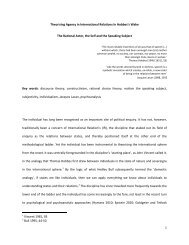Hate Crime and Vilification Law: Developments - The University of ...
Hate Crime and Vilification Law: Developments - The University of ...
Hate Crime and Vilification Law: Developments - The University of ...
Create successful ePaper yourself
Turn your PDF publications into a flip-book with our unique Google optimized e-Paper software.
4<br />
<strong>The</strong> legislation does not make it clear whether pro<strong>of</strong> <strong>of</strong> incitement requires evidence that others<br />
have in fact been incited. In certain cases that have come before the Courts, those accused <strong>of</strong><br />
incitement have sought to argue that the concept <strong>of</strong> incitement encompasses both the act <strong>of</strong> the<br />
alleged inciter <strong>and</strong> the reaction <strong>of</strong> those who have been incited. <strong>The</strong>y have contended that pro<strong>of</strong> is<br />
required that other people have actually been incited.<br />
However, the Courts have not accepted that contention. <strong>The</strong> case law establishes that<br />
“incitement” can be proved even in the absence <strong>of</strong> evidence that other people have in fact been<br />
roused to hatred (or to acting upon that hatred). Rather, the test is whether a hypothetical<br />
audience <strong>of</strong> reasonable people who are neither immune from, nor particularly susceptible to,<br />
feelings <strong>of</strong> hatred on one <strong>of</strong> the prohibited grounds would be incited.<br />
An alternative approach would be to ab<strong>and</strong>on the terminology <strong>of</strong> incitement altogether in favour <strong>of</strong><br />
some other test. I discuss this in more detail in the section headed “<strong>The</strong> Criminal Provisions”.<br />
(c) Hatred, serious contempt or severe ridicule<br />
Anti-vilification legislation in other States in Australia has replicated the formulation “hatred<br />
towards, serious contempt for, or severe ridicule <strong>of</strong>” that appears in the ADA. Federally, Part IIA <strong>of</strong><br />
the Racial Discrimination Act employs the expression “hatred” only. Examples <strong>of</strong> both formulations<br />
can be found in analogous legislative provisions in other countries. Little seems to turn on the<br />
distinction, even though “serious contempt” <strong>and</strong> “severe ridicule” are arguably less stringent criteria<br />
than “hatred”.<br />
<strong>The</strong> interpretation <strong>of</strong> these words does not seem to have presented courts in Australia or overseas<br />
with undue difficulty. <strong>The</strong> plain dictionary definition <strong>of</strong> these words entails something in the nature<br />
<strong>of</strong> intense or active dislike. That definition excludes much material that would widely be regarded<br />
as innocuous. For example, humour based on ethnic or homosexual stereotypes, considered in<br />
context, can <strong>of</strong>ten be accepted as light-hearted <strong>and</strong> even, in a uniquely Australian way,<br />
affectionate. It would clearly fall outside the operation <strong>of</strong> the criminal (<strong>and</strong> civil) provisions.<br />
Western Australia’s legislation has exp<strong>and</strong>ed the scope <strong>of</strong> the behaviour that is prohibited to<br />
include behaviour whose effect is “to threaten [or] seriously <strong>and</strong> substantially abuse” others on a<br />
prohibited ground. But these formulations are used in the context <strong>of</strong> a Criminal Code proscribing<br />
criminal conduct <strong>and</strong> do not sit comfortably with legislative provisions which impose civil<br />
prohibitions.<br />
(d) <strong>The</strong> Prohibited Grounds<br />
Neither the civil provisions nor the criminal provisions <strong>of</strong> the ADA apply unless there has been a<br />
public act <strong>of</strong> incitement to hatred <strong>of</strong> a person or group on one <strong>of</strong> four grounds, namely:<br />
(i) Race<br />
(ii) Homosexuality<br />
(iii) HIV/Aids infection; or<br />
(iv) Transgender identity (ie being a transgender person).<br />
“Race” is defined in s.4 <strong>of</strong> the ADA as including “colour, nationality, descent <strong>and</strong> ethnic, ethnoreligious<br />
or national origin”. This broad definition is declaratory <strong>of</strong> the case law on the meaning <strong>of</strong><br />
“race” as it has developed both in Australia <strong>and</strong> overseas. However, vilification solely on the<br />
ground <strong>of</strong> religion would fall outside the prohibitions contained in the ADA.<br />
<strong>The</strong> existing prohibited grounds therefore afford protection against vilification only to some groups.<br />
<strong>The</strong>se groups appear to have been selected on the basis <strong>of</strong> a well-recorded history <strong>of</strong> their<br />
members being victims <strong>of</strong> hatred. A question arises whether the prohibited grounds should be

















